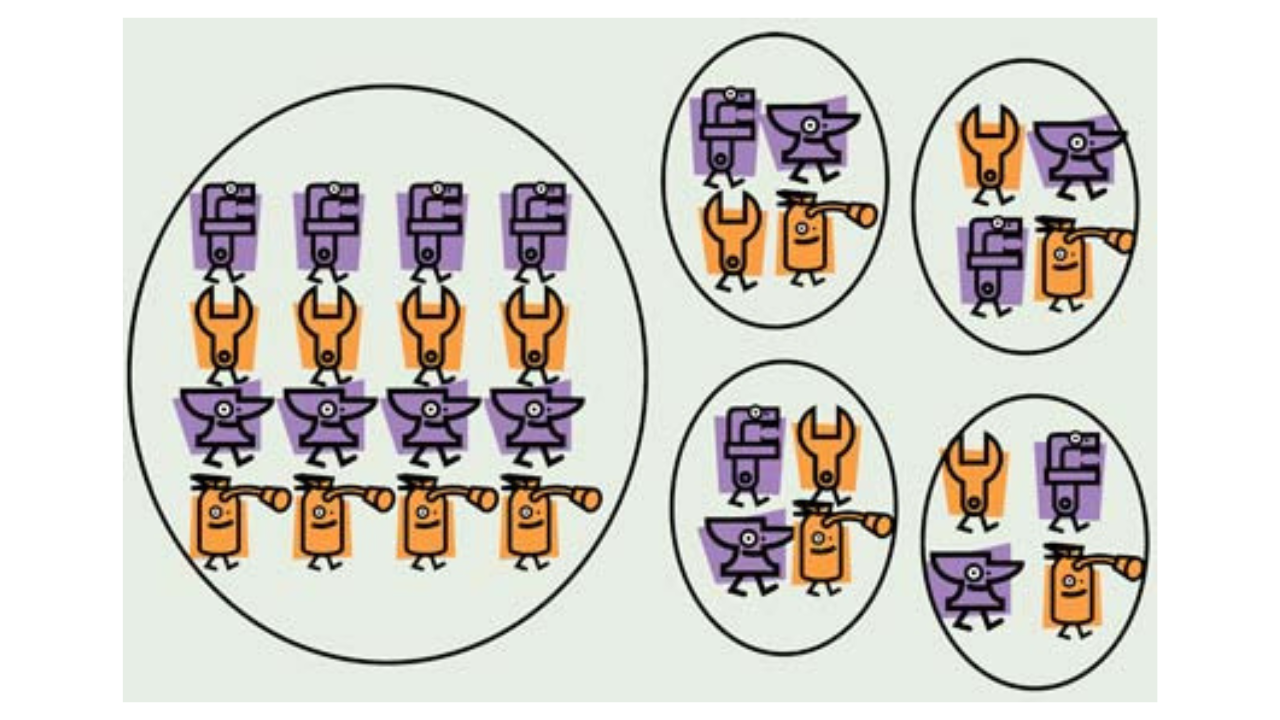The Story of a Work Order
Tarek Atout, Qatargas
ONCE UPON A TIME in a maintenance department, a work order woke up in the morning, feeling very lazy, unable to open his eyes or get up to walk. It’s been a long time for him in the same room, nobody knocks on the door to say hello, how are you, or to release him so he can show his presence. He looks in the mirror and finds he has changed a lot since being created and kept in the backlog. Looking at gray hair covering his head, he tries to remember his lifecycle since that day when he became a pending order waiting for spare parts to arrive. This spurred his friends to give him the nickname, “Nomat.”
Nomat always looks at the identification bracelet hanging on his arm that reads, “Urgent Job,” wondering if so urgent, why he was here for this long. He still remembers the day he was created. He was not alone; many work orders were created on the same day, but he doesn’t know where they are now. One day, the scheduler grabbed all the work orders with him, but kept him alone. Since then, the same scenario has been repeated every week. The scheduler passes by the room and takes many work orders; sometimes the scheduler returns some of them, but pulls them again in a week or two, but not Nomat. Each time the scheduler arrives in the room, Nomat tries to call out loudly, “Hey, I am Nomat, is today my turn? Hey, any good news? Have my materials arrived?” He knows the scheduler’s name, but the man never turns his face or bothers to see who is shouting.
One night, Nomat sneaked into the planning offices to search the compliance and key performance indicator reports to find any updates about his future. Nomat was surprised to find that he is very popular; his name is everywhere in backlog reports, work order aging reports, urgent pending work order reports and in three or four other reports that are circulated to all levels every week or month. Yet, he still feels lost in the crowd.
Another night, Nomat was unable to sleep. The backlog room was very hot and many work orders were producing too much noise. He opened his diary to record what happened that day, something he has been doing during this long time. While going through the diary, he noticed a telephone number with a work order name. He remembers this work order; he was also in this room for some time, but waiting for a shutdown opportunity. He didn’t stay long, as the scheduler pulled him after only one month. Nomat decided to call this work order and dialed the number. Luckily, a sound came at the other end.
Nomat: Hey, this is Nomat, are you Sdown? Do you remember me, we met at the backlog, maybe one year before?
Sdown: Yes, of course Nomat, how are you, where are you, what is your status?
Nomat: I am here in the backlog room!
Sdown: Whaaat? Are you still pending all this time? Why?
Nomat: Yes, for the same reason, waiting for materials to arrive, what about you?
Sdown: Not better than you, still not done. The day the scheduler grabbed me, I assumed I would be implemented during the existing shutdown at that time, but the final shutdown scope was issued without including me.
Nomat: Have you tried to speak up to the shutdown coordinator or even the manager to solve your problem, or at least to know why you were excluded?
Sdown: I tried many times, they were busy wanting to complete the shutdown safely and on time. No one listened to me, after all, who would bother with a work order that was dropped from the scope!
Nomat: I thought you had been closed after this long absence! So why are you still there? You must come back to the backlog room with us!
Sdown: The scheduler is still hiding me. He didn’t even change my status, so I am not in the backlog list. He is worried that he would be in trouble if I appear on the list as he forgot me during the last shutdown.
Nomat: How can he track you if you are not assigned your correct status?
Sdown: I asked the same question. He said, “Don’t worry, you are in my mind. You will be done during the nearest opportunity, I’ll remember; you are in my database.”
Nomat: Oh, sorry about this, can I help you?
Sdown (laughing with irony) No, thanks, just help yourself.
Nomat: You are right. What about our friends who were called by the scheduler and left with you on the same day?
Sdown: Many of them have been completed and closed, but unfortunately, not much details about what happened during job completion or any remedial action taken. When you talk to any one of them, they remember well all the events up to scheduling day, but when it comes to execution, they lost their memory.
Nomat: Do you remember this fat work order that had three children orders, he was very kind, any news about him?
Sdown: Yes, this work order is in a real drama. All his children work orders have been closed, but he is still opened. He had applied for many appeals as this situation is not logical or fair, but he is still waiting for justice. He cries a lot because he misses his children and he is no longer fat!
Nomat: What a miserable situation. He was only created to protect his children, not for a job; he must be closed routinely.
Sdown: Many sad situations happened. I am located near to the scheduler and hear a lot of tragedies.
Nomat: Tragedies! What do you mean?
Sdown: Many work orders are closed by mistake, some are reopened by higher authorities to amend wrong data related to cost or consumed spares. Have you heard about last night’s fight?
Nomat: No, you know, I am in the backlog room in silo. What fight?
Sdown: Two work orders were created for the same job. The fight was over which one to close and what to do with the other one. They’re both for the same preventive maintenance job and a third one is due for generation next week. Most of these PM orders are really unlucky.
Nomat: Why do you say that?
Sdown: I had a tour in the maintenance office; I heard sharp arguments between a maintenance supervisor and a group of PM orders. It went something like this:
PM Orders: Why did you close all of us without doing the job?
Maintenance Supervisor: What job! You are all about visual checks. Do you think I have time to waste in this trivial work? I have been doing this for a loooong time and nothing has happened. These jobs have no value to the health of the equipment. If I had to do all these types of work orders, I wouldn’t have time for important jobs.
PM Orders: So why did you create us? You can ask to stop the generation of this work.
Maintenance Supervisor: Who will listen?! Management has its own strategies and objectives that are not practical, however the next batch will be generated soon, I receive it every month or three months, if I have time I will do part of it.
Nomat: Oh Sdown, this is too much! I can’t bear to hear all these stories. I feel upset and worry about my future. Let’s talk later, take care and have a good night.
Nomat stretched on the bed, recalling the words during Sdown’s call, especially when he said, “Just help yourself.” He decided to start the new day with a new strategy; he will go far and wide to assure a better future for himself. He tried to rest, but failed to go into a deep sleep. During his intermittent dozing, many nightmares scared him; his mind visualized many horrible scenarios about what to expect when he started the search journey.
In the morning, he decided to go everywhere in the organization and not back down before finding out the answer to the question, “Why have I been in the backlog for more than a year and when will I be scheduled?” He selected to start with the planner, he knows his office.
Nomat: Good morning, I am Nomat. He tried to tell the full story, but the planner was busy.
After hearing part of the story, the planner said:
The Planner: Sorry my friend, I have done my job. I delivered the job pack and created a purchase requisition to procure the required materials. It is not my job to follow up. I have many jobs waiting planning, I don’t have time to look behind, I only look at the future. You can ask the scheduler, he may be able to give you some information. Sorry!
Nomat was disappointed, but he decided to complete the journey. He walked directly to the scheduler’s office, he knows him very well, too. This man jumps every week to the backlog room and never pays any attention to his shouts. As he reached the office, the scheduler was reviewing the work orders aging report. Nomat waited silently, looking at the report until he found his name and suddenly shouted, “Oh, that’s me!” The scheduler got scared from this sudden shout.
Scheduler: Who are you?
Nomat: I am……. and every week you…. I am an urgent job but… Again, he tried to tell the full story, but the scheduler stopped him.
Scheduler: Why are you in a hurry for scheduling? Please be patient. Every week, I receive the materials status from the procurement supervisor. What is required for you has not yet arrived. Please go back to the backlog room and when you became ready to be scheduled, I will call you.
Nomat was about to fall down after these words. He doesn’t know where to go next, but then he thought that the procurement supervisor may help. He decided to be more firm this time. Once in the procurement office, Nomat started to tell the full story directly to the supervisor and never allowed him to interrupt or stop the story. His story finished, Nomat then asked, “How can an urgent job wait for the materials for this long of a time?!”
Procurement Supervisor: Who said that you or the required materials are urgent?
Nomat: Look at the tag in my hand, see, “Urgent Job!”
Procurement Supervisor: But the purchase requisition that was raised at that time is not flagged as urgent, accordingly, it was treated as normal. A normal process is very long, with many approvals required, especially with high price items. Also, there has been much recycling between me and the vendor since the materials specification was not clear. However, I think within three to four months, the spares will arrive and you will go for execution very soon.
Nomat: But I am urgent, how come the purchase requisition is not? Thanks!
Working hours were about to end, so Nomat went to his room to have a rest after last night’s poor sleeping and to think about his next step.
In the morning, he decided to create a conflict between the job originator and maintenance; he moved to the operations room and found one supervisor.
Nomat: I am Nomat, the urgent job you requested a very long time ago and as you can see, I am still in the backlog room. Why did you not take any action or follow up to expedite for me?
Operations Supervisor: Actually, I am not the person who requested the job. The other man is off shift and will be back after three days; you can come back then to check with him.
Nomat: Can you please check your logbook for any notes about me?
Operations Supervisor (quickly going through the book): No recent notes about you, I’ll have to check the old logbooks. However, if I remember correctly, I think we have taken some mitigation actions and I believe you are no longer urgent. Good luck.
Nomat decides to do his last trial. He will go to the equipment itself to check what happened. He knows the functional location where the equipment is installed. He dressed up in all the required personal protective equipment; he knows the rules well, no one is allowed to go to the site without wearing the proper protective equipment.
Nomat reached the location and observed. Not believing what he found, Nomat rubbed his eyes and stared again. Then he realized the equipment is not in its location. He ran to the neighboring location and asked the installed equipment there. It confirmed that it was the correct location, but the work order equipment was removed based on modifications in the design done by the engineering department and this would be the permanent situation.
Nomat was shocked. On his way back to the backlog room he was mumbling, “I am an urgent job for nonexistent equipment.” Once in the room, he lay down on his back and said, “In this missing links environment, no work order can guarantee his future.”
THE END

Tarek Atout
Tarek Atout is currently working with Qatargas in the maintenance excellence group. He has 21 years’ experience working with many international organizations in the Middle East as a consultant in maintenance planning, work management, inventory control and CMMS development and implementation where he participated in improving the maintenance functions by developing the maintenance strategies, planning process and work management flow and roles with associated performance indicators. Tarek is a Certified Maintenance and Reliability Professional “CMRP” by SMRP and can be contacted at [email protected].
Related Articles

A Planner's Tool Kit

Uptime: Fill Out Work Orders? Who's Got Time for Paperwork?

Tips for Maintenance Planning

Centralized Maintenance vs. Decentralized

You Cannot Maximize Production or Reduce Costs Without the use of an Effective Planned Maintenance System

Work Order Prioritization




